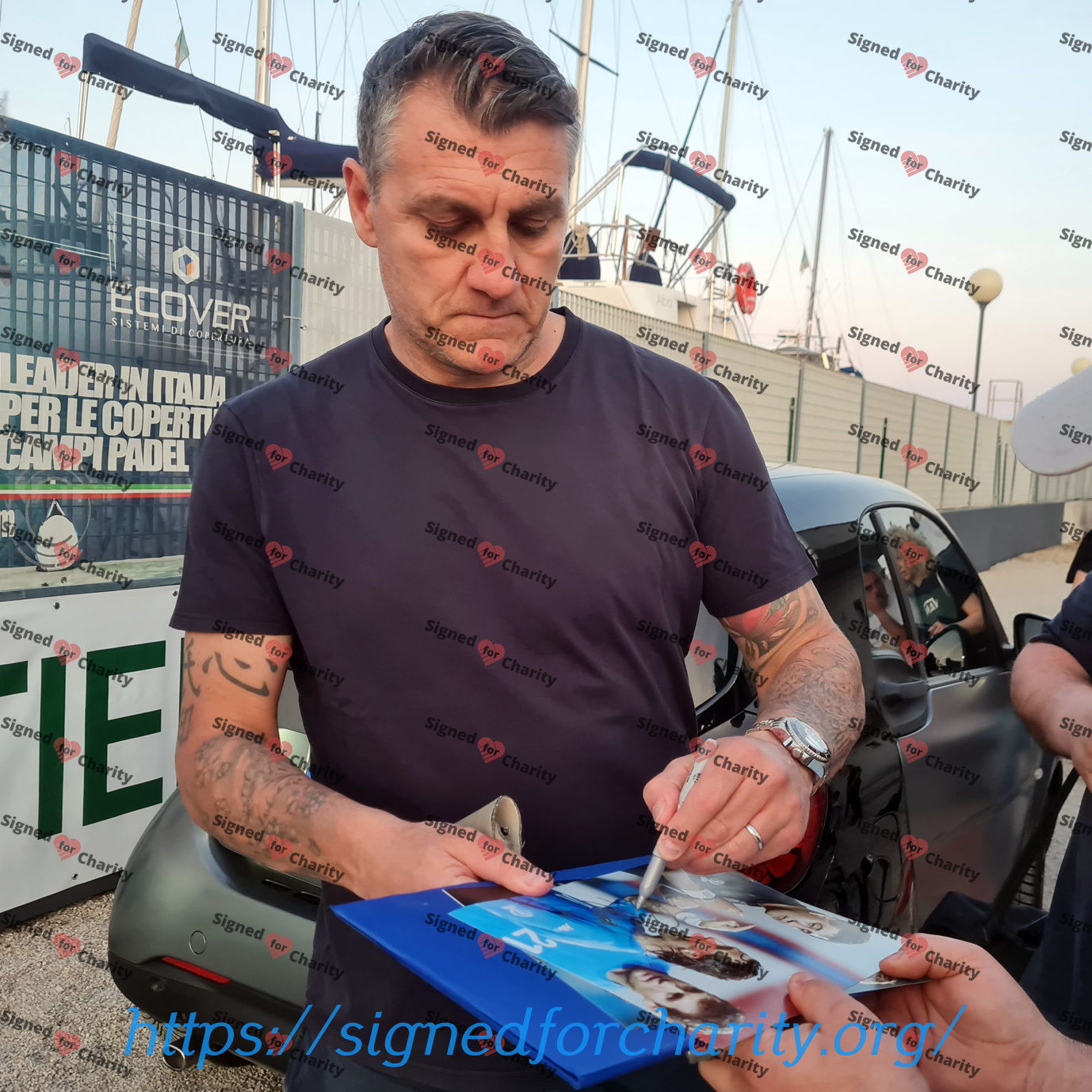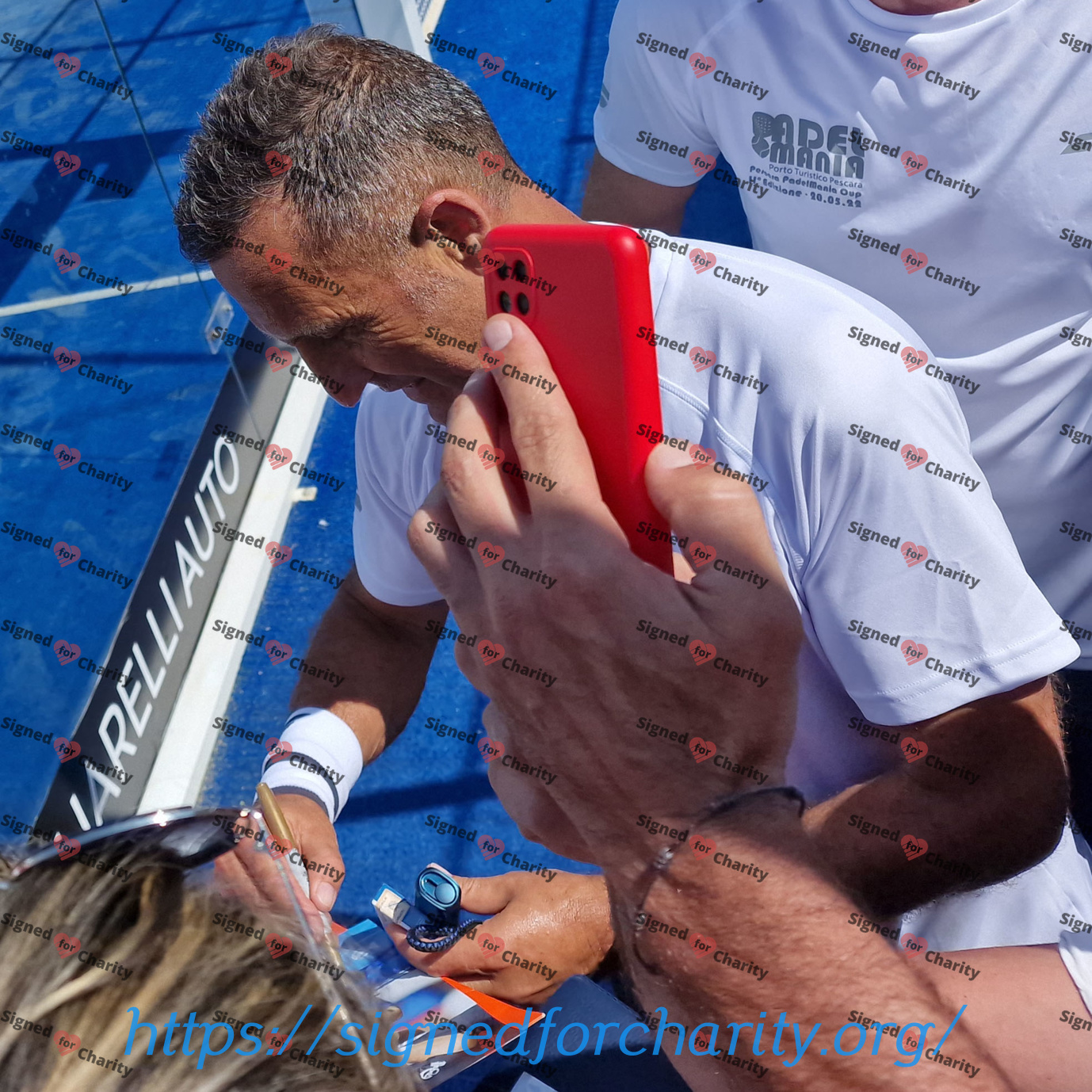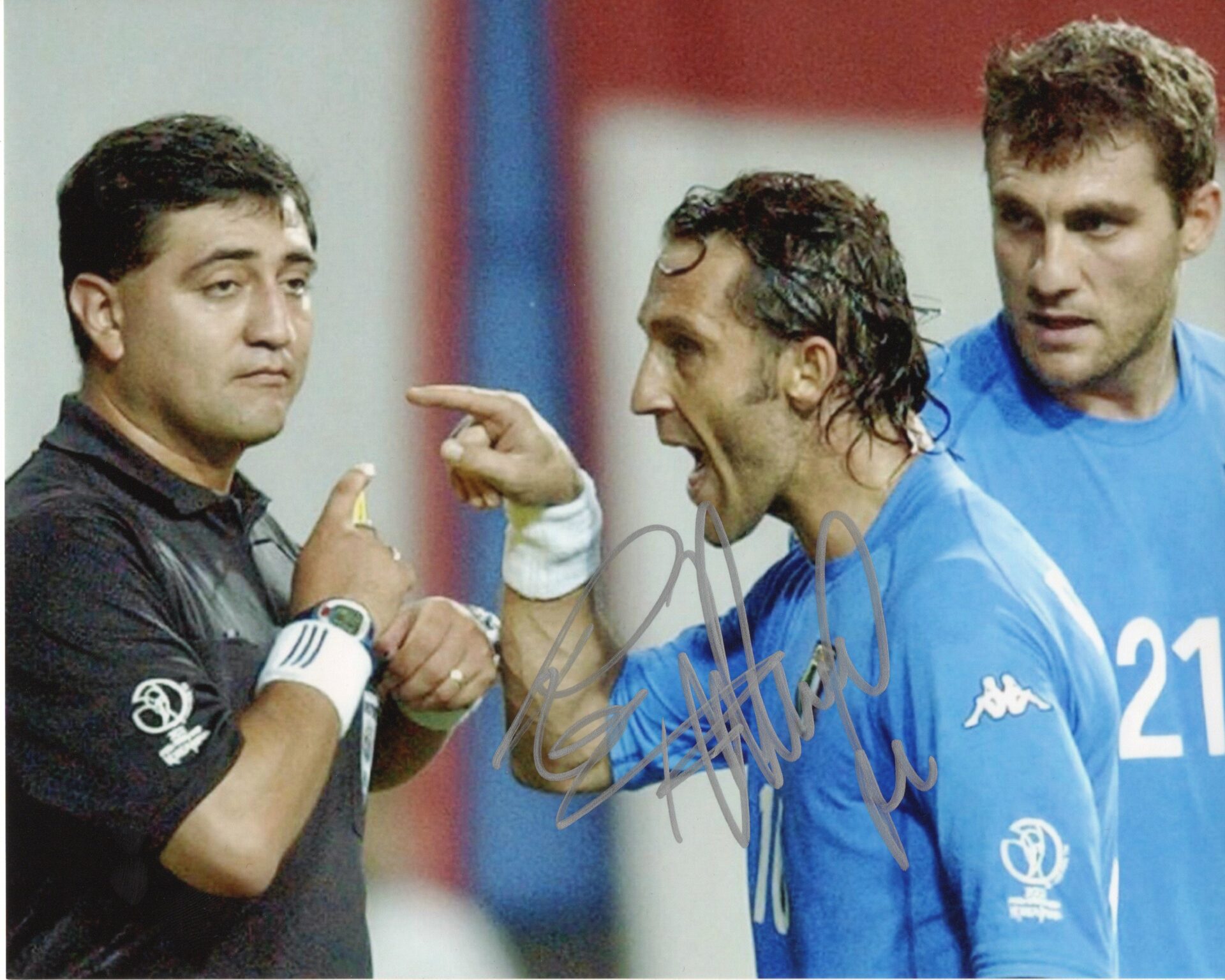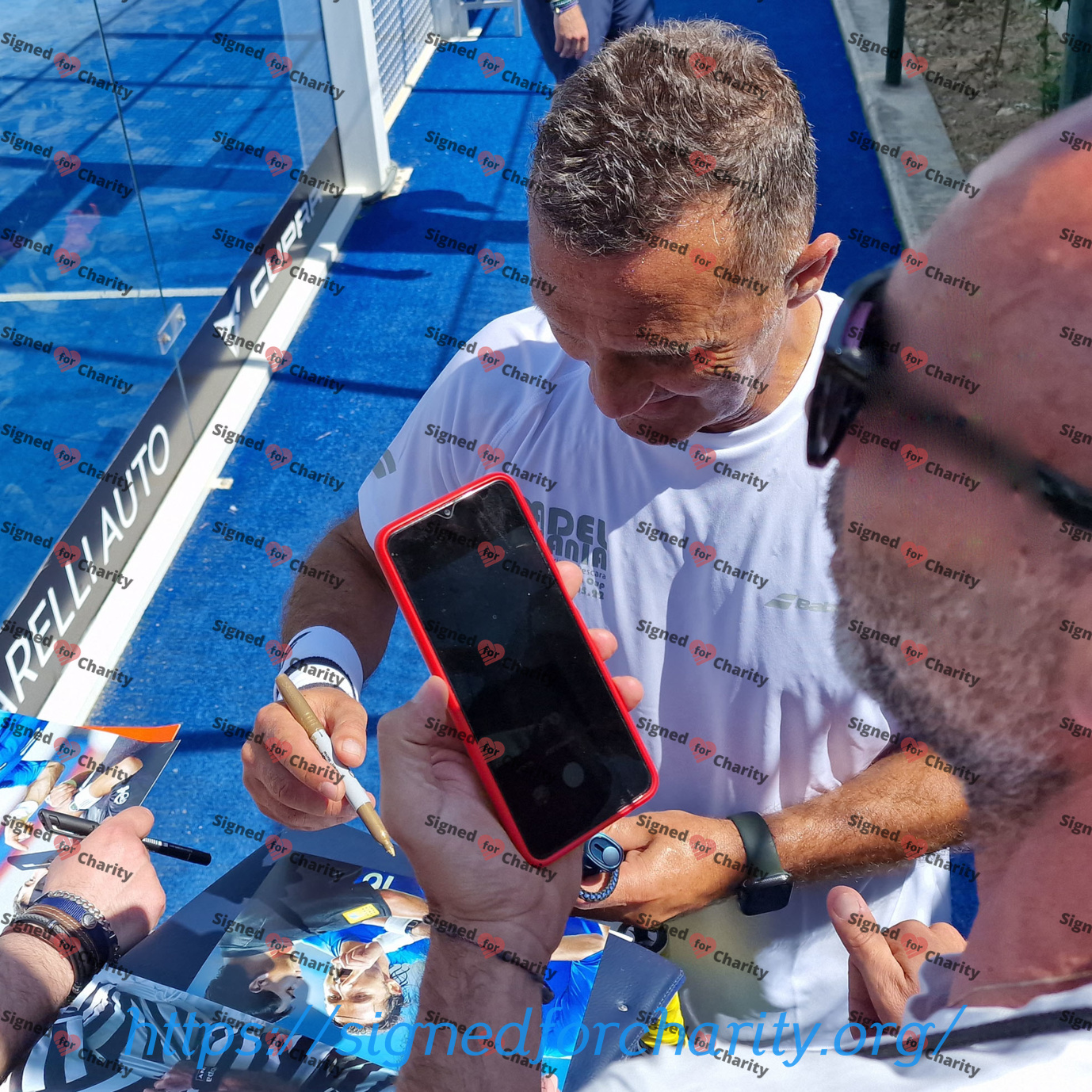Description
CHRISTIAN VIERI BIOGRAPHY:
Christian Vieri (born 12 July 1973) is an Italian former professional footballer who played as a centre forward. Having been born in Italy, Vieri moved with his family to Australia as a child, before returning to Italy to pursue his professional career at a young age. He then spent the bulk of his career playing in the Serie A. Vieri was named in the FIFA 100, a list of the 125 greatest living footballers selected by Pelé as a part of FIFA’s centenary celebrations. A prolific goalscorer, for a number of years, he was regarded as one of the best strikers in Europe, leading to him becoming the world’s most expensive player in 1999 when Inter Milan paid Lazio £32 million (€43 million) for his services. Something of a footballing nomad, Vieri played for no fewer than 12 clubs throughout his career, mainly in Italy, but also in Spain and France. He started his career with Torino in 1991, but his most notable and successful spells were those at Juventus, Atlético Madrid, Lazio and Inter, clubs with which he won several honours. As well as picking up several winners medals during his career, Vieri also claimed many individual awards including the Pichichi Trophy and Capocannoniere awards for the league’s top scorer in Spain and Italy respectively, and the Serie A Italian Footballer of the Year twice. At international level, Vieri scored 23 goals in 49 appearances for Italy between 1997 and 2005, and is the joint ninth-highest goalscorer for his national team, alongside Francesco Graziani. He is also Italy’s highest ever goalscorer in the FIFA World Cup, along with Roberto Baggio and Paolo Rossi, with a combined nine goals from nine matches at the 1998 and 2002 editions of the tournament; he also took part at Euro 2004.
ANGELO DI LIVIO BIOGRAPHY:
Angelo Di Livio Cavaliere OMRI (born 26 July 1966) is an Italian former professional football midfielder and defender. He played for several Italian clubs in Serie A throughout his career, coming to prominence with Juventus, where he won several domestic and international titles. At international level he also played for the Italian national side in two FIFA World Cups and two UEFA European Championships, reaching the final of UEFA Euro 2000. During his playing career he was known as soldatino (toy soldier) or soldatino Di Livio, a nickname his Juventus teammate at the time Roberto Baggio gave him because of Di Livio’s characteristic way of running up and down the flank.
Club career
Born in Rome, Di Livio began his career with Roma in 1984. Having failed to make an appearance in his only season for the club, Di Livio played for Reggiana (1985–86), Nocerina (1986–87), Perugia (1987–89), Padova (1989–93), Juventus (1993–99) and Fiorentina (1999–2005). His tireless running and quality crossing made him an important element in the dominant Juventus starting lineup from 1993 to 1999, during one of the most successful periods in the club’s history. With Juventus, he won three scudetti (Italian A League; 1995, 1997, 1998) and one Champions League title (1996), in addition to two Italian Supercups (1995, 1997), a Coppa Italia, an UEFA Supercup (1996), and an Intercontinental Cup (1996); he also reached the final of the 1994–95 UEFA Cup. In 1999, he moved to Fiorentina, where he captained the team to win the Coppa Italia during the 2000–01 season. In 2002, when AC Fiorentina went bankrupt and was reborn as Florentia Viola in Serie C2, Di Livio showed his dedication by being the only player to stay with the team, as he played through the depths of Italian football on the climb back to Serie A in 2004, finally retiring after the conclusion of the 2004–05 Serie A season.
International career
Di Livio was capped 40 times for Italy. He played for Italy at Euro 96, the 1998 FIFA World Cup, Euro 2000 (where Italy finished in 2nd place), and the 2002 FIFA World Cup. His first cap came on 6 September 1995 against Slovenia; his last on 18 June 2002 against South Korea. At Euro 1996, he set-up Pierluigi Casiraghi’s first goal in the team’s 2–1 win in the opening group match against Russia. For Italy, he was often used as a holding player to shut down games when the team was ahead, thus sealing the win.
Club career
Born in Rome, Di Livio began his career with Roma in 1984. Having failed to make an appearance in his only season for the club, Di Livio played for Reggiana (1985–86), Nocerina (1986–87), Perugia (1987–89), Padova (1989–93), Juventus (1993–99) and Fiorentina (1999–2005). His tireless running and quality crossing made him an important element in the dominant Juventus starting lineup from 1993 to 1999, during one of the most successful periods in the club’s history. With Juventus, he won three scudetti (Italian A League; 1995, 1997, 1998) and one Champions League title (1996), in addition to two Italian Supercups (1995, 1997), a Coppa Italia, an UEFA Supercup (1996), and an Intercontinental Cup (1996); he also reached the final of the 1994–95 UEFA Cup. In 1999, he moved to Fiorentina, where he captained the team to win the Coppa Italia during the 2000–01 season. In 2002, when AC Fiorentina went bankrupt and was reborn as Florentia Viola in Serie C2, Di Livio showed his dedication by being the only player to stay with the team, as he played through the depths of Italian football on the climb back to Serie A in 2004, finally retiring after the conclusion of the 2004–05 Serie A season.
International career
Di Livio was capped 40 times for Italy. He played for Italy at Euro 96, the 1998 FIFA World Cup, Euro 2000 (where Italy finished in 2nd place), and the 2002 FIFA World Cup. His first cap came on 6 September 1995 against Slovenia; his last on 18 June 2002 against South Korea. At Euro 1996, he set-up Pierluigi Casiraghi’s first goal in the team’s 2–1 win in the opening group match against Russia. For Italy, he was often used as a holding player to shut down games when the team was ahead, thus sealing the win.







